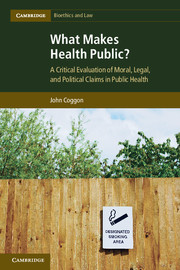 What Makes Health Public?
What Makes Health Public? Book contents
- Frontmatter
- Contents
- Foreword
- Acknowledgements
- What makes health public?
- Part I Basic concepts in public health
- Part II Evaluating evaluations: making health public
- 7 Analysis in the political realm
- 8 Making health public
- 9 Conclusion to Part II
- Part III Tackling responsibility: liberal citizens as subjects and sovereigns
- Bibliography
- Index
- References
7 - Analysis in the political realm
from Part II - Evaluating evaluations: making health public
Published online by Cambridge University Press: 05 June 2012
- Frontmatter
- Contents
- Foreword
- Acknowledgements
- What makes health public?
- Part I Basic concepts in public health
- Part II Evaluating evaluations: making health public
- 7 Analysis in the political realm
- 8 Making health public
- 9 Conclusion to Part II
- Part III Tackling responsibility: liberal citizens as subjects and sovereigns
- Bibliography
- Index
- References
Summary
Introduction
The core question of this book is what makes health public? My base contention is that this question must be prior, and its answer central, to any endeavour in public health law and ethics. And more practically, its answer supports all claims about the defensibility of any progression in the name of, or conservatism against, proposed public health policy. “What makes health public?” is necessarily a political question, whose proper answer is therefore also political. This may seem a statement of the obvious, but it bears such blunt presentation. Recognising the home of our debate as a political one is key to recognising the sorts of ideas that are (and are not) relevant. This manner of approach shares its rationale with Bernard Williams’ exploration of political freedom, and the premium he places on situating its investigation in a political (as opposed, e.g., to a metaphysical) context: in Williams’ words: “we must take seriously the point that because it [i.e. political freedom] is a political value, the most important disagreements that surround it are political disagreements”. In Part I, I presented seven distinct meanings of public health that find themselves in the literature and in discussions ostensibly on the subject. Their wide variation reinforces any pessimism about finding some unitary definition that everyone has ‘in fact been meaning’. It is thus unhelpful to descend into dogmatism about ‘what public health is or isn’t’, or to use such claims as the basis of normative argument. Giving ‘public health’ a kind of activist role in our deliberations on the best shaping of society is problematic. It is preferable to work out first what society should be about, and allow that to direct our conclusions on how this means, inter alia, public health policies and practices should be. This all amounts to an enterprise in politics, and demands consideration as such.
In Chapter 2, where we focused on the meaning of public, I followed Bruce Jennings and distinguished ‘overlapping concerns’ and ‘shared concerns’. Overlapping concerns simply refer to matters that affect many or all people. For example, the functioning of the human heart is an overlapping concern; it is something that is relevant to everyone. Health, however it is understood, is an overlapping concern; it is something of relevance to each of us. This is something we can take ex ante to be true. It does not of itself mean that we should value each other’s health, prioritise it, or even care about it. It just means it is something that affects each of us. Shared concerns, by contrast, present themselves where something about one person is, in crude terms, the business of everyone else. Within private relationships, concerns can also be shared. A couple will often share many of their personal concerns, health-related and otherwise. But this idea of sharing is distinct. What we need to find, if public health ethics is to come to anything, are concerns that are shared with everyone (within a political community); we need to know, for example, why my drinking alcohol might be yours and everyone else’s business. The current chapter looks at this question. To derive an understanding of political community, I contrast political and moral philosophy, and consider arguments about anarchism and the State. The arguments demonstrate how the political normativity in a community may be related to, and contrasted with, moral and legal normativity. As there is a danger of being ‘divided by a common language’ on these matters – e.g. what one person calls ‘political philosophy’ another may call ‘legal philosophy’ – the first half of the chapter explains how I distinguish moral, political, and legal spheres of thought. The second half sharpens the distinctions through critical analysis of arguments about political authority. Finally, I consider how we should approach paternalism and the ‘population perspective’, which feature with increasing prominence in debates in public health law and ethics.
- Type
- Chapter
- Information
- What Makes Health Public?A Critical Evaluation of Moral, Legal, and Political Claims in Public Health, pp. 99 - 148Publisher: Cambridge University PressPrint publication year: 2012
